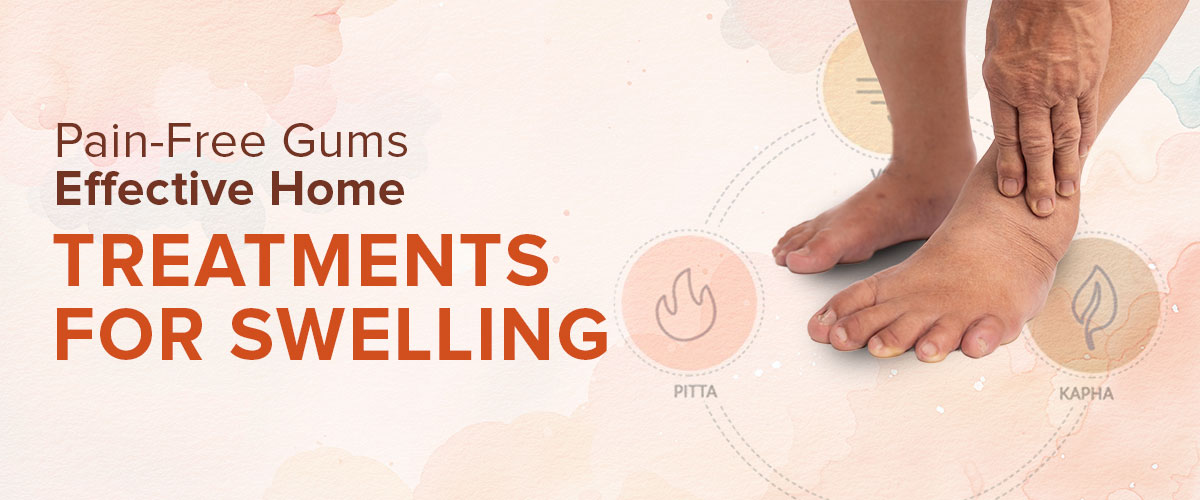Home Remedies For Gum Swelling

Gum swelling is a common condition faced by most people and could be characterised as puffy, tender gums that may bleed occasionally (when brushing or flossing). Swollen gums are often a red flag signalling potential issues in oral health that shouldn't be ignored.
Home remedies can provide relief from the discomfort and pain of gum swelling. There are simple, effective techniques and natural remedies that can be implemented from the comfort of your home to alleviate swollen gums. These remedies will also help to improve oral hygiene and gum health in the long run.
What is Gum swelling?
Gum swelling (gingival swelling) is an inflammation of the gum tissue that causes discomfort and sensitivity. It is characterised by red and puffy gums, which are at times painful also. Swollen gums bleed more easily when flossing or brushing & may deter individuals from maintaining good oral hygiene. The swelling is generally a result of an accumulation of sticky film of bacteria (plaque), which collects on gums and teeth.
Plaque hardens into tartar if it is not removed by flossing and brushing. It can cause serious gum diseases (like periodontitis or gingivitis). Swollen gums might also be an indication of various other health issues like deficiency of vitamins, hormonal changes, or reactions to several medications. Knowing the causes of gum swelling and implementing effective home care routines are important to controlling this common dental issue.
What Causes Gum Swelling?
Gum swelling is a common oral health issue that may be caused by many factors ranging from poor dental hygiene to serious dental issues. The treatment and prevention of gum swelling require an understanding of its underlying causes. Listed here are some of the primary reasons for gum swelling.
Plaque Accumulation: The plaque that collects on the tooth is the most common reason for gum swelling. Plaque is a sticky film of food debris, bacteria, and saliva. If plaque isn't removed by flossing and brushing, it solidifies into tartar and results in inflammation and swelling of the gum.
Gingivitis: Gingivitis is the early stage of gum disease and is caused by plaque buildup. It makes the gums inflamed and tender, often resulting in swelling. Untreated gingivitis could progress to serious periodontal illnesses.
Poor Nutrition: A diet lacking in nutrition can weaken the immune system and make it harder for the body to fight off infections that cause gum swelling. Vitamin deficiencies (Vitamins C and K) are linked to poor gum health.
Infections: Bacterial or fungal infections may also lead to swelling of gums. Conditions like thrush or viral infections (affecting the mouth) can cause discomfort and inflammation.
Hormonal Changes: Hormonal fluctuations (during pregnancy, menstruation, puberty, and menopause) can make gums more susceptible to swelling. These modifications might affect the way the body reacts to bacteria and can worsen the condition of the gums.
Home Remedies and Tips
There are many home remedies that can help reduce inflammation and provide relief from gum swelling. These remedies are simple and can be easily followed at home:
Saltwater Rinse: The easiest and one of the best remedies for swollen gums is washing your mouth with saltwater. Salt possesses antimicrobial properties that reduce bacteria (that cause infection and inflammation). Dissolve 1 teaspoon of salt in a cup of hot water and swish it around your mouth for 30 seconds, and then spit it out. Do it 2 to 3 times a day (after meals).
Clove Oil Application: Clove oil has an anaesthetic (eugenol) that contains pain-relieving and anti-inflammatory properties. To use clove oil for gum swelling, dab a small amount of clove oil on a cotton ball and apply it gently to the affected area.
Cold Compresses: Apply a cold compress to the outside of your face (near the swollen area). It will reduce gum swelling by constricting the blood vessels, thereby decreasing inflammation and numbing any pain. For cold compress, wrap ice cubes in a clean cloth (or use a cold pack), and apply it to your face for 15 minutes every hour.
Tea Tree Oil Rinse: Tea tree oil possesses anti-inflammatory and antibacterial properties. It is an excellent remedy for treating swollen gums that reduces bacteria and inflammation in the gums. Add 1 drop of tea tree oil to a glass of warm water. Use this tea tree water as a mouthwash daily. Don’t swallow it, as tea tree oil can be toxic if ingested.
Aloe Vera: Aloe vera has healing and soothing properties. Pure aloe vera gel can soothe irritation and lower inflammation in the swollen gums. You can apply aloe vera gel directly using a finger or cotton swab. Let it sit for a few minutes before washing your mouth.
Turmeric Paste: Turmeric is another anti-inflammatory agent and has curcumin in it. Mix turmeric powder with a little water to make a paste. Massage your gums using turmeric paste and leave it on for a couple of minutes, and then wash it off with water. Do this twice daily to reduce pain and swelling.
Green Tea: Using cooled tea bags as compresses can also be helpful. Antioxidants in green tea reduce inflammation and heal the gums. Place a cooled tea bag in the affected area for 5 minutes a few times a day.
Lifestyle and Diet Recommendations
Maintaining healthy gums involves adopting a lifestyle that supports overall oral health. Following are lifestyle recommendations to reduce gum swelling and improve the condition of your gums over the long term.
Maintain Oral Hygiene: Brush your teeth twice daily with a fluoride toothpaste. Use a soft-bristled toothbrush to avoid irritation. Floss every day to remove plaque and food particles from between your teeth. You can also use an antiseptic mouthwash to remove plaque buildup.
Regular Checkups: Visit your Ayurvedic doctor at least twice a year for professional consultations. It will also help to find out and cure any early signs of gum disease.
Quit Smoking: Smoking is one of the major causes of gum disease. Quitting smoking can improve your oral health and reduce gum inflammation.
Manage Stress: High-stress levels can weaken your immune system and make it harder for your body to fight off infections (that cause gum disease). Practice stress management techniques such as yoga, meditation, deep breathing exercises, etc.
Diet for Gum Swelling
What you eat plays a significant role in the health of your gums. A nutrient-rich diet can improve your gum health and prevent problems before they start.
Increase Vitamin C Intake: Increasing your intake of vitamin C can strengthen your immune system and help fight gum inflammation. Include plenty of vitamin C-rich foods (oranges, strawberries, kiwi, and bell peppers) in your diet.
Eat More Omega-3 Fatty Acids: Omega-3s have anti-inflammatory properties. Include sources of omega-3 fatty acids like fish, flaxseeds, and walnuts, etc.
Avoid Sugary Foods and Beverages: Sugar is a leading cause of plaque and tartar buildup, which causes gum swelling. Limit sugary snacks and drinks to protect your gums.
Hydration and Avoiding Irritants: Keeping hydrated helps cleanse the mouth and gums of food particles and bacteria. Avoid tobacco smoke, alcohol, spicy or acidic foods, and other irritants, as these can exacerbate gum swelling and negatively affect the process of gum healing.
FAQs
1. What is the home remedy for gum swelling?
A simple home remedy is to rinse your mouth with warm salt water a couple of times daily. It kills bacteria and decreases swelling. You can also apply clove oil in your mouth to lessen the pain. Brush your teeth gently and avoid very hot and cold foods.
2. What is the fastest way to heal swollen gum?
To quickly heal swollen gums, rinse your mouth with salt water, put clove oil on your gums with a clean finger or cotton, and stay away from spicy or hard foods. Drinking water often keeps your mouth clean and moist. Flossing could help right away if the swelling is caused by food stuck between teeth.
3. Does rubbing salt on gums help?
Rubbing plain salt directly could be too harsh and irritating to the gums. Rather, stir a little salt in some warm water and rinse your mouth. This cleans the area, decreases swelling and fights germs gently. Do this 3-4 times each day for better relief.
4. How long will gum swelling last?
With the right care, like rinsing and brushing, swelling from irritation or food particles usually goes down in two to three days. It might last longer and need treatment if it's caused by an infection or gum disease. If the swelling doesn't go down after a week, see an Ayurvedic doctor.
5. Can warm water and salt cure gum infections?
Warm salt water doesn't completely get rid of an infection, but it can help with swelling, pain, and germs in the mouth. This helps to prevent the infection from spreading and also promotes healing. Use it alongside brushing, flossing and gentle oral care. For more serious infections or pus, an expert examination is necessary.
6. Which Ayurvedic medicine is best for gum swelling?
Triphala churna is a traditional Ayurvedic oral health preparation. Gargling with Triphala decoction reduces swelling and also strengthens gums. Ayurvedic tooth powders containing clove, neem and babool also work. Massage your gums with til (sesame) oil for relief.
7. Why are my gums suddenly swollen?
If your gums suddenly swell, it could be because food got stuck between your teeth, you brushed too hard, you got sick, or you had a bad reaction to dental products. For some people, it has to do with poor dental hygiene or gum disease. If the swelling hurts, is red, and lasts more than a few days, see an Ayurvedic expert.
8. Can vitamin C cure swollen gum?
Vitamin C repairs tissues and boosts immunity that relieves swollen gums. If your gums are inflamed due to a deficiency, consume more amla, lemon, oranges or guava. It may not cure infections by itself, but can support gum healing.
9. Can acidity cause swollen gums?
Yes, acidity can hurt your teeth and gums. When you burp or have acid reflux, stomach acid can get into your mouth, which can irritate your gums and make them swell. Acidity can also weaken gums by making it hard to digest food and not getting enough vitamins. Taking care of your gut health is also good for your teeth.



 Prev
Prev

























































































































